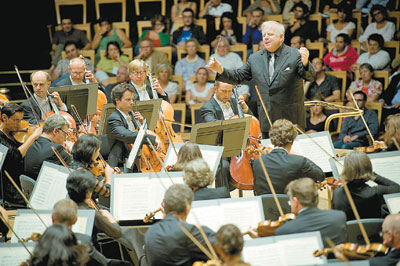
Seven-time Grammy award-winning conductor Slatkin and ONL will deliver a concert featuring an all-French repertoire. The program will include “Roman Carnival Overture” by Berlioz, “Carmen Suites” by Bizet, Gabriel Faure’s “Pavane,” Erik Satie’s “Gymnopedies,” Camille Saint-Saens’ “Samson and Delilah,” Ravel’s “The Waltz” as well as Debussy’s works.Debra Li
debra_lidan@163.com
SPENDING New Year’s Eve at a classical music concert has become not just a popular choice for hardcore fans but also a trendy lifestyle for China’s well-educated younger generation. No wonder there are so many concerts available in town around that time.
Apart from Shenzhen Symphony Orchestra, the city’s own personal pride, musicians and orchestras from Germany, Italy, France, Britain, Austria and Hungary have all joined ranks, promising night after night of classical music of various flavors between Christmas and New Year. With such competition, it takes some true star appeal to win the heart of an increasingly sophisticated and picky audience.
Leonard Slatkin and his Lyon National Orchestra (ONL) now seem to have passed muster. Seven-time Grammy award-winning conductor Slatkin and ONL will deliver a concert featuring an all-French repertoire. The program will include “Roman Carnival Overture” by Berlioz, “Carmen Suites” by Bizet, Gabriel Faure’s “Pavane,” Erik Satie’s “Gymnopedies,” Camille Saint-Saens’ “Samson and Delilah,” Ravel’s “The Waltz” as well as Debussy’s works.
“We are bringing at least 96 musicians on the China tour,” Slatkin told Shenzhen Daily in an email. “We will have a large orchestra for these programs.”
The conductor praised the ONL for its unique and delicate approach to music.
“The winds play with characteristic French sonority, mostly because they use French-made instruments. The strings have a lush sound and in some ways are a bit more central European,” he said. “We have been specializing in the French repertoire of Berlioz, Ravel and others.”
When asked to pick a favorite, special recommendation for the local audience, Slatkin chose Ravel’s “The Waltz.”
“The work is virtually a summary of all this composer’s skills, both as a writer and orchestrator,” he explained.
The conductor said he looked forward to collaborating with cellist Wang Jian, but revealed unfortunately that Wang would not appear at any of the concerts in Shenzhen and Guangzhou due to scheduling problems.
The conductor seemed not surprised that so many orchestras are vying for the attention of local audiences during the New Year season.
“These are difficult times for orchestras around the world,” he said. However, the master is “generally optimistic about the future.”
“We all must work to build new audiences, but at the same time, sustain those who have been with us for many years. Introducing new works has always been part of my musical life.”
“Both my orchestras, in Detroit and Lyon, have embraced the digital world of the 21st century. We broadcast to audiences all over the planet. There is no question that this is the direction many orchestras must take to secure a viable future. In addition, relating to one’s own community remains vital.”
Jeffery Gu, professor of Shenzhen University and a fervent classical music fan, endorsed ONL’s repertoire.
“I’m not very familiar with this orchestra or the conductor, but the repertoire is obviously well-chosen,” he said. “It’s neither too ‘light’ for a sophisticated fan, nor too dauntingly ‘heavy’ for a newbie who has just learned to appreciate the beauty of classical music.
“Unlike the Vienne New Year’s Concert always featuring the works by Johann Strauss, both father and son, this concert blows some fresh air into the local music scene.”
Time: 8 p.m., Dec. 31
Venue: Shenzhen Poly Theater, intersection of Wenxin Road 5 and Houhaibin Road, Nanshan District (南山区后海滨路与文心五路交界处深圳保利剧院)
Metro: Shekou Line, Houhai Station (后海
站), Exit E
|

